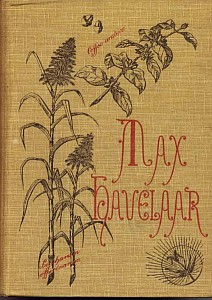Max Havelaar

Front cover of Max Havelaar, 5th edition (1881)
|
|
| Author | Multatuli |
|---|---|
| Original title | Max Havelaar, of de koffie-veilingen der Nederlandse Handel-Maatschappij |
| Country | Netherlands |
| Language | Dutch |
|
Publication date
|
1860 |
Max Havelaar: Or the Coffee Auctions of the Dutch Trading Company (Dutch: Max Havelaar, of de koffi-veilingen der Nederlandsche Handel-Maatschappij) is an 1860 novel by Multatuli (the pen name of Eduard Douwes Dekker), which played a key role in shaping and modifying Dutch colonial policy in the Dutch East Indies in the nineteenth and early twentieth century. In the novel, the protagonist, Max Havelaar, tries to battle against a corrupt government system in Java, which was then a Dutch colony.
By the mid-nineteenth century, the colonial control of the Dutch East Indies (present-day Indonesia) had passed from the Dutch East India Company (VOC) to the Dutch government due to the economic failure of the VOC. In order to increase revenue, the Dutch colonial government implemented a series of policies termed the Cultivation System (Dutch: cultuurstelsel), which mandated Indonesian farmers to grow a quota of commercially crops such as sugar and coffee, instead of growing staple foods such as rice. At the same time, the colonial government also implemented a tax collection system in which the collecting agents were paid by commission. The combination of these two strategies caused widespread abuse of colonial power, especially on the islands of Java and Sumatra, resulting in abject poverty and widespread starvation the farmers. The colony was governed with a minimum of soldiers and Government officials. The former rulers maintained their absolute power and control over the natives. A quite common strategy used by many colonizing countries.
In addition, the Dutch state earned a fortune with the sale of opium to the natives, this opium-trade was started centuries before during the VOC-times. At that time opium was the only known effective pain killer, and a considerable part of the natives was hooked on it, being kept poor in this way. This was called the "opium-regime". To distinguish between smuggled and legal opium, a simple reagent was added. After discovery the smuggler could count on a severe punishment.
...
Wikipedia
